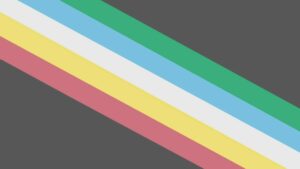It’s Disability Pride Month, and many in New England want more celebration

For Chrysanthemum Gates, who spoke this month at a Disability Pride event in Augusta, Maine, Disability Pride Month is about increasing inclusion and creating safe environments for disabled people to be themselves. “My disabilities, especially the Tourette’s, have shaped so much of my life that I would not be the same person that I am today if I didn’t have it,” Gates said. (Sean Duffy / Provided Photograph)
Earlier this month at a city park in Augusta, Maine, Chrysanthemum Gates got a chance to speak at her first ever in-person Disability Pride event. Gates, a social media disability advocate with Tourette Syndrome, said she wished more people knew about events like this in New England.
“I really feel like if more people knew about the event and attended if they were able to, they would also kind of share the sentiment of ‘Wow, I feel very empowered by this and feel a lot better about themselves,” Gates said.
Sarah Trites shared a poem she wrote at that same event. She’s a Maine resident and has a speech impediment. Trites said the dialogue surrounding people with disabilities has come a long way.
“When I was growing up, the disability, you know, was kind of hidden back then and now it’s more out there and more people are aware of it, because anybody can become disabled at any time,” Trites said.
The idea for Disability Pride Month originated in 1990, the same year the Americans with Disabilities Act (ADA) was signed into law. Members of the disabled community in Boston are credited with holding the first Disability Pride celebration that same year. The event was held in Boston for a second year, but ended after that.
This July, Disability Pride events are taking place around the U.S., but there have been few events in New England.
Kasey Mimitz, director of youth services at Stavros Center for Independent Living in Amherst, Massachusetts, said before he was hired, he had no idea that there was a Disability Pride Month.
There’s also a Disability Pride flag, which has been displayed at in-person events and on social media. Mimitz says he doesn’t see the flag flying anywhere in New England.
“Where’s the Disability Pride flag?” Mimitz said. “If I didn’t work where I work, I wouldn’t even know what it looked like, because I’ve actually never seen one out and about in the community.”

The creation of a visually safe Disability Pride flag is being credited on social media to Virginia designer Ann Magill. (Courtesy of Ann Magill)
Advocates in New England say Disability Pride Month is becoming more well-known, but it’s not recognized like Disability Employment Awareness Month in October or Disability Awareness Month in March. Mimitz says these months are very different from each other.
“Disability Awareness Month, it’s like bringing light to the more medical side, like you have Breast Cancer Awareness Month, it’s very specific, where the difference with Disability Pride, it’s more celebrating, not trying to find a cure like ‘let’s be aware of this problem.’ But I don’t look at it as a problem,” Mimitz said. “I think one is more like a celebration and one [is] more like the educational portion.”
Max Barrows, the outreach director of Green Mountain Self-Advocates in Montpelier, Vermont, said more recognition of Disability Pride Month would benefit everyone.
These kinds of events increase visibility for the disability community, Barrows said, and they help bring disabled people into discussions about issues that affect them.
“We often say this: Nothing about us without us,” Barrows said. “People with disabilities need to have the final say in all decisions about our lives.”
Barrows said his organization is focusing on tolerance and recognition for other parts of identity too. For example, Barrows says it’s important for him to be accepted both as autistic and Black.
“I want both sides to continue to understand me as a whole person no matter what my identities are,” he said.
More pride and recognition can help disabled people become more normalized in their communities, Barrows added, and get rid of the stigma that their conditions are a burden to others and a problem that needs to be solved.
“Disability Pride Month would be a way for society to recognize that a disability is just another part of what it means to be a human being and for us to be proud of who we are,” Barrows said.

“I really feel like if more people knew about the event and attended if they were able to, they would also kind of share the sentiment of ‘Wow, I feel very empowered by this’ and feel a lot better about themselves,” said Chrysanthemum Gates after speaking this month at a Disability Pride event in Augusta, Maine. (Sean Duffy / Provided Photograph)
Gates agrees.
As part of her work on social media, Gates has had some success getting businesses in New England to give more access to wheelchair users.
For her, Disability Pride Month is about increasing inclusion and creating safe environments for disabled people to be themselves.
“My disabilities, especially the Tourette’s, have shaped so much of my life that I would not be the same person that I am today if I didn’t have it,” Gates said.
